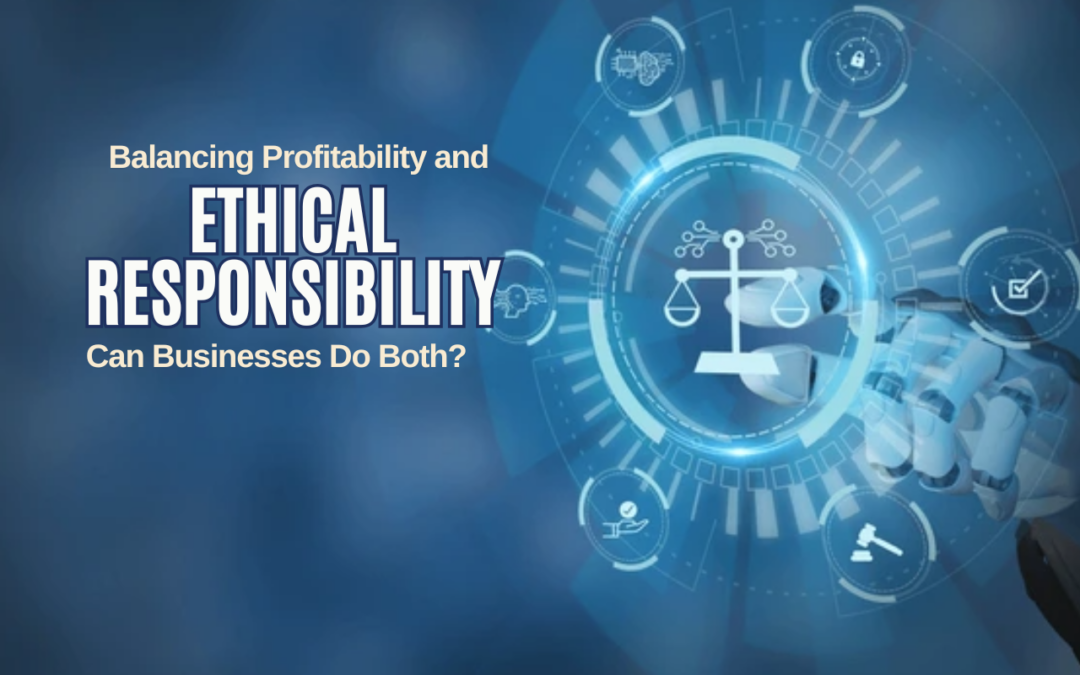The business landscape is undergoing a transformation as consumers, employees, and investors increasingly demand more than just products or services—they want companies to act ethically and responsibly. However, achieving a balance between profitability and ethical responsibility remains a challenging yet essential task for businesses aiming for long-term success.
In this blog, we’ll explore how businesses can align ethical practices with profitability, the challenges they face, and examples of companies excelling in both.
The Evolution of Ethical Business Practices
In the past, the primary focus of businesses was maximizing shareholder value, often at the expense of other stakeholders. This traditional profit-first approach has given way to more holistic strategies due to shifting societal values. Ethical business practices now play a critical role in:
- Consumer choices: People are more inclined to support brands aligned with their values.
- Investor priorities: ESG (Environmental, Social, and Governance) metrics are increasingly important in investment decisions.
- Employee retention: Workers, especially younger generations, want to work for purpose-driven companies.
The Role of Technology and Globalization
Advancements in technology and globalization have made it easier for stakeholders to access information about a company’s ethical practices—or lack thereof. Transparency is no longer optional, as news about unethical behavior spreads quickly and can tarnish reputations overnight.
How Ethical Responsibility Drives Profitability
Contrary to the perception that ethical practices are a financial burden, they often boost a company’s bottom line. Here’s how:
1. Building Consumer Trust
Consumers are more loyal to brands that demonstrate integrity and responsibility. According to a 2023 survey by Nielsen, 73% of global consumers said they would change their consumption habits to reduce their environmental impact. This loyalty translates into repeat business and positive word-of-mouth marketing.
Example: Patagonia, an outdoor apparel brand, champions environmental activism. Its commitment to sustainability has not only fostered a loyal customer base but also distinguished it from competitors.
2. Attracting and Retaining Talent
Ethical companies appeal to purpose-driven employees, especially Millennials and Gen Z. Happy employees lead to higher productivity and reduced turnover costs.
Example: Google emphasizes employee well-being and ethical practices, making it one of the most desirable employers globally.
3. Innovative Solutions and Market Opportunities
Ethical responsibility often pushes companies to innovate. Sustainable solutions can attract new customers and open doors to premium markets.
Example: Tesla’s focus on renewable energy has revolutionized the automotive industry, tapping into a growing demand for environmentally friendly transportation.
4. Long-Term Cost Savings
Ethical practices like sustainable sourcing, waste reduction, and energy efficiency may involve initial investment but lead to significant cost savings over time.
Example: IKEA’s commitment to renewable energy and efficient operations has reduced its carbon footprint and operational costs.
Challenges in Balancing Profitability and Ethics
Despite the benefits, achieving a balance is not without obstacles.
1. High Initial Costs
Implementing ethical practices such as sustainable materials, fair wages, and energy-efficient technologies often requires significant upfront investments.
Example: Transitioning to renewable energy sources or implementing fair labor practices can strain smaller businesses financially.
2. Competitive Market Pressures
In industries with slim margins, businesses may feel pressured to cut corners to stay competitive.
Example: Fast fashion brands often prioritize speed and cost-efficiency over ethical sourcing, though this has led to reputational damage in the long run.
3. Complex Supply Chains
Ensuring ethical practices across global supply chains can be challenging, especially for companies relying on multiple suppliers in regions with varying regulations.
Example: Tech companies sourcing rare earth metals face scrutiny for labor and environmental practices in supplier countries.
4. Balancing Stakeholder Demands
Companies often face conflicting demands from shareholders, customers, and employees. Balancing these expectations requires strategic decision-making.
Strategies for Aligning Ethics with Profitability
For businesses striving to harmonize ethical responsibility with financial success, the following strategies can help:
1. Make Ethics Core to the Business Model
Ethics should not be an afterthought. Integrate responsible practices into every aspect of your operations, from product design to supply chain management.
Example: Unilever’s “Sustainable Living Plan” embeds sustainability into its brands, contributing to its profitability.
2. Leverage Technology for Transparency
Use blockchain and other digital tools to ensure transparency in supply chains and operations.
Example: Companies like Provenance use blockchain to trace the origin of materials, offering consumers insight into ethical sourcing.
3. Engage Stakeholders
Involve customers, employees, and investors in shaping your ethical policies. Feedback from these groups can help create initiatives that resonate across all levels.
4. Educate Consumers and Employees
Promote awareness about your ethical practices through marketing campaigns and internal programs. This not only reinforces your brand’s commitment but also builds a culture of responsibility.
5. Measure and Report Progress
Implement ESG metrics and report your progress regularly. Transparent reporting enhances credibility and accountability.
Example: Salesforce’s annual ESG report highlights its achievements in sustainability and diversity, earning investor trust.
Real-World Examples
Patagonia: Activism and Profit
Patagonia donates 1% of its revenue to environmental causes and actively campaigns for sustainability. Its strong ethical stance has translated into exceptional brand loyalty and financial success.
The Body Shop: Fair Trade Pioneer
The Body Shop was one of the first companies to promote cruelty-free and fair-trade products. By focusing on ethical sourcing, it created a unique market position and cultivated a loyal customer base.
Starbucks: Ethical Sourcing
Starbucks sources its coffee beans through ethical trade practices and invests in programs to support farmers. This commitment has strengthened its reputation and market leadership.
The Path Forward
Balancing profitability and ethical responsibility is no longer a choice—it is a necessity. Businesses that fail to adapt risk alienating customers, employees, and investors. On the other hand, companies that integrate ethics into their strategies position themselves as leaders in a competitive and values-driven marketplace.
By viewing ethical responsibility not as a cost but as an investment, businesses can achieve long-term profitability while making a positive impact on society and the environment.












